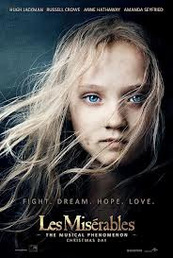 I saw two movies this Christmas season--The Hobbit and Les Miserables. I had mixed feelings about The Hobbit Peter Jackson seems to have lost sight of the fact that the extreme success of Lord of the Rings was at least in part due to the care he took to be faithful to the original books. We all knew The Hobbit would give more emphasis to the One Ring since Tolkien himself didn’t know its importance when he wrote the book before he ever thought of its sequels. But the film adds and changes unnecessarily to my mind. I will see the other films, but I didn’t leave the theater planning to buy the extended version DVDs to view over and over as I have LOTR. I did appreciate the dwarves rendition of “Chip the glasses and crack the plates! (that's what Bilbo Baggins hates.)” Some readers skip Tolkien's poetry, but I listen to the audio of all four books annually and the poetry, read, chanted or sung by Britain's Rob Ingles, is some of the best parts.
But the unforgettable movie for me this season was Les Miserables. The voices aren’t as powerful as either the London or Broadway recordings. (As my sister put it, these are actors who can sing rather than singers who can act.) But it isn’t exactly realistic to be belting out a beautiful melody when your heart is broken anyway. Try it sometime. Your throat constricts and you can hardly get out a whisper. But what that whisper conveys is raw emotion, and this movie has plenty of it. When I left the theater I felt like I had been through an old-fashioned washing machine wringer like we used to use in Ethiopia. My companions and I had been on a powerful journey together. Admittedly, it isn’t realistic to sing your way through life at all, but this is modern opera, filled with beautiful melodies. Some of those melodies reoccur as a “normal” movie would use an instrumental theme. The story is about redemption. Jean Valjean, who has spent nineteen years in forced labor for stealing a mouthful of bread, is offered grace and the chance to turn his life around. He sings his struggle, gazing into “the whirlpool of [his] sin” and turning from it. The same melody and some of the same words return when Inspector Javert, the Pharisaic policeman who pursues Valjean for breaking his parole, is offered grace, but cannot humble himself to accept it. The advantage that film has over the stage is the ability to use setting for emphasis. However marvelously engineered the stage sets (and Les Mis pioneered some fabulous ones), the audience is far away and the producer has no way to focus on a telling detail short of the character’s pointing it out. In the film version, we can rise high above the city of Paris is see the loneliness of a single barricade with a handful of student revolutionaries. The escape through the sewers is characterized by actual muck. The rooms and gardens are simply much more “real” than they ever could be on the stage. A stage set represents; in a film set we are there. This is above all a musical. I have seen the stage play in London and New York. I have practically memorized the recordings. A couple songs are missing ("Dog Eats Dog") or cut short like “Drink with Me” —a token verse rather than the whole, forgivable in a three-hour movie they are trying not to make longer. I was disappointed that Valjean’s struggle with Javert at the bedside of the dying Fantine was cut short. The original ends with Valjean swearing to protect her child as he holds off Javert, the policeman threatening to pursue him as long as necessary. The melody passes back and forth in a kind of counterpoint as the two exchange blows, but ends in unison, “I swear to you, I will be there”—the same words, totally contrasting meanings. One song is added in the film when Valjean takes the child Cosette from her abusive guardians. It’s a song about falling in love as a father. But a line in Valjean’s last confession is also changed to imply that his transformation is due to his love for the child rather than the grace of God, even though he would never have had compassion on Cosette’s mother Fantine nor on the child if it had not been for his earlier experience of God’s grace. I found myself wondering if this was a secularist's attempt to explain the unexplainable. For music, I will continue to listen to the stage version I have loved for twenty years, but there is no denying that the film version is a powerful piece of story telling that is a wonderful jumping off point for discussing God’s grace and the ways it can transform a life and who knows? maybe even a culture. (I am a fan of the Her.maneutics blog. Check out their great article about women in Les Mis this week.)
1 Comment
LeAnne
1/8/2015 06:06:27 am
This post was moved from another site. All comments were lost.
Reply
Leave a Reply. |
AuthorLeAnne Hardy has lived in six countries on four continents. Her books come out of her cross-cultural experiences and her passion to use story to convey spiritual truths in a form that will permeate lives. Add http://www.leannehardy.net/1/feed to your RSS feed.
To receive an e-mail when I post a new blog, please subscribe.
Categories
All
Archives
November 2022
|
 RSS Feed
RSS Feed